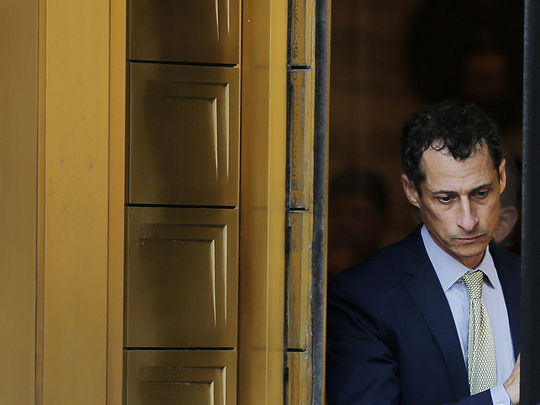
New York: He lost his seat in Congress, his audacious bid to resurrect his career as mayor of New York City, and his high-profile marriage. And he undermined Hillary Clinton’s shot at the presidency in the closing days of the tumultuous 2016 campaign.
On Monday, Anthony Weiner, sobbing as the judge spoke, learned the final, personal cost of his seemingly uncontrollable habit of exchanging lewd texts and pictures with women: 21 months in prison.
Weiner, 53, was the essence of the brash politician fuelled by relentless work and unbridled swagger. Until now, he was the beneficiary of multiple second chances, amid earnest vows that he had learned his lesson.
But this time, there would be no second chance for Weiner, who pleaded guilty in May to one count of transferring obscene material to a minor, and had faced up to 10 years in prison.
His texting habit fuelled his long and tortuous downfall. But it was his most recent exchanges with a 15-year-old girl that were the most personally ruinous: his wife filed for divorce, he pleaded guilty and now faces imprisonment.
Before the sentence was pronounced, Weiner did not so much ask for leniency as try to make a case that he had accepted full responsibility for his crime, and that he was a changed man.
“I acted not only unlawfully but immorally, and if I had done the right thing, I would not be standing before you today,” he said, crying as he addressed the judge.
“The prosecutors are sceptical that I have truly changed and I don’t blame them,” he said. “I repeatedly acted in an obviously destructive way when I was caught.”
Reports of the federal investigation that led to Weiner being charged in the case first surfaced after the 15-year-old victim’s story was told in a DailyMail.com expose last September.
It was during that investigation that the FBI discovered on Weiner’s laptop a trove of emails belonging to his wife, Huma Abedin, a senior aide to Clinton. That led to an announcement in late October by James Comey, then the FBI director, that the bureau had opened a new inquiry into Clinton’s handling of official email. The inquiry ended two days before the election; Clinton has blamed Comey in part for her defeat.
The judge, Denise L. Cote of US District Court in Manhattan, told Weiner that his offence was “a serious crime that deserves serious punishment.”
She said that there was a uniform opinion among those who had examined him that he had “a disease that involves sexual compulsivity; some call it a sex addiction.”
The judge said Weiner was finally receiving “effective treatment for this disease,” including attending group therapy and Sex Addicts Anonymous. “I find he is making an enormous contribution to others who are suffering from that same disease,” she added. “But the difficulty here,” the judge said, “is that this is a very strong compulsion, so strong,” she continued, that “despite two very public disclosures and the destruction of his career on two occasions, he continued with the activity.”
She cited Weiner’s illegal exchanges with the girl on Skype, Snapchat and a site called Confide in early 2016. Prosecutors had said in their sentencing memo that during some of these communications, Weiner “used graphic and obscene language to ask the victim to display her naked body and touch herself, which she did.”
“The defendant knew this young woman was in high school and getting her learner’s permit,” Cote said.
After the judge left the bench, Weiner remained seated at the defence table between his lawyers, Arlo Devlin-Brown and Erin Monju. He was bent deeply forward in his chair, sobbing, his face in his hands.
The judge also fined Weiner, who must surrender by November 6, $10,000. She said he would also have to register as a sex offender.
In a letter to the judge, Weiner had said he felt “profound” regret for his crime, adding that his “continued acting out over years crushed the aspirations of my wife and ruined our marriage.”
Abedin filed her own one-page letter to the judge, asking for leniency on behalf of their son. She did not attend the sentencing.
The judge also addressed one issue that Weiner’s lawyers had raised in their papers: questions about the teenager’s motives and credibility. They noted she had received $30,000 for the DailyMail.com story and was “shopping” a book proposal.
The judge said the girl’s motives and the fact she had initiated the contact with Weiner were irrelevant: “She was a minor. She was a victim. She is entitled to the law’s full protection.”












